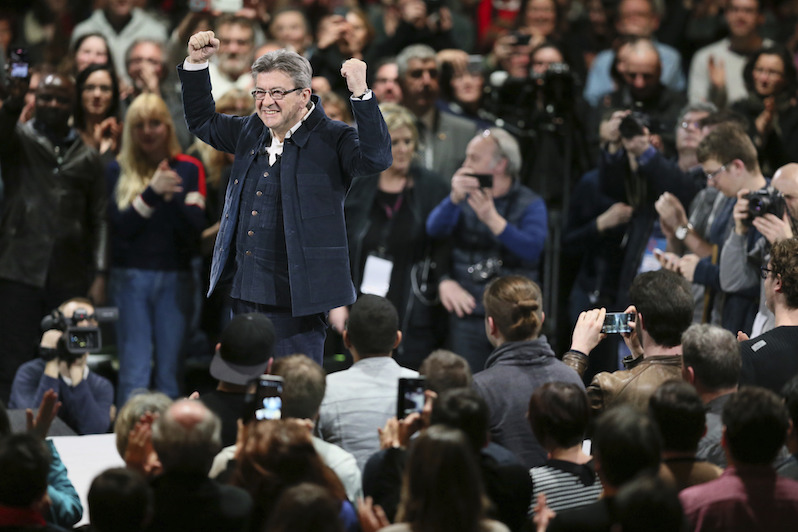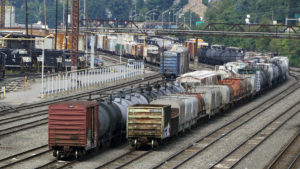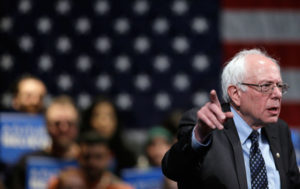As French Election Nears, a Bernie Sanders-Style Candidate Rises in the Polls
The threat of proto-fascist Marine Le Pen continuing the trend started by Brexit and Donald Trump’s victory is tempered by the possibility that a socialist—Jean-Luc Melenchon -- could prevail. The threat of proto-fascist Marine Le Pen continuing the trend started by Brexit and Donald Trump’s victory is tempered by the possibility that a socialist—Jean-Luc Melenchon—could prevail. Shades of Sanders: French presidential candidate and socialist Jean-Luc Melenchon draws a crowd at a rally in Rennes, France, on March 26. (David Vincent / AP)
1
2
3
4
Shades of Sanders: French presidential candidate and socialist Jean-Luc Melenchon draws a crowd at a rally in Rennes, France, on March 26. (David Vincent / AP)
1
2
3
4
So how is Macron’s rise possible? On the one hand, it’s testimony to the establishment’s skill at manipulating political spectacles (Macron is considered handsome, “France’s Justin Trudeau”), but it also represents the establishment’s greatest weapon: exploiting the understandable fear of uncertainty among members of the general population, even as they realize the current political economic order is stagnant at best.
In contrast, radical politicians like Sanders, the witty and erudite Melenchon, and the rebellious left of the Socialist Party that secured the nomination of Hamon call it like it is. They contend that the contemporary free market and the attendant pro-business ideology of Reagan/Thatcher/Clinton/Blair has run aground, just as the postwar golden era of the ’50s and ’60s had by the 1970s.
Looking back at that time, the Reagan/Thatcher reaction was clearly not the right answer, but it was an answer to a real crisis of capitalism. Now we find ourselves in an analogous crisis, but with the class dynamics inverted: In the 1980s the elites were winning a counteroffensive, reversing long-standing progressive victories. Now, the elites’ preferred ideology of neoliberalism that delivered us to this dead end must be rebuffed. In contrast to the ’80s, enthusiasm is growing to use democracy to empower public institutions to reorganize the economy along lines that serve the people and the planet.
Now, don’t misunderstand me: I’m not saying that simply winning an election will conjure up utopian outcomes. Tremendously powerful forces will align against any socialist government in a major country. Success won’t come easily, but that doesn’t change the fact that in contrast to Teams 1 and 2, the policy proposals of Team 3 have a proven track record, having built the greatest middle-class societies in human history from the 1930s to the ’70s. What’s more, both Melenchon’s and Sanders’ proposed resetting of policies, programs and regulations directly address the social and economic woes of our time, just as the Great Depression was overcome by New Deal social policies, which were then built upon from Franklin Delano Roosevelt’s tenure through the Nixon era. So, only Team 3’s program is a serious attempt to improve society; in contrast, Team 1 delivers spectacular gains for Davos attendees (aka, the 1% of the 1%), while Team 2 promises short-term catharsis for the resentful.
One of the questions that floated freely during the 2016 American election cycle, especially among those of us on the left — one that strikes me as relevant again with Melenchon’s rise confirming the rebirth of the radical electoral left — was the question of whether Bernie Sanders was really, as he claimed, a socialist. Many felt he was merely a New Deal social democrat. I am among what seems to be a minority on the radical left who feels that Sanders is indeed a socialist.
As is evident from what I’ve written above, I think Sanders’ prescription for our crisis — an updated social democratic program that strengthens social services, redistributes wealth, builds infrastructure, supports sustainable energy, and provides free (taxpayer supported) universal health care and college education — is a pragmatic response.
In this regard, the very fact that Sanders calls himself a socialist is in itself significant. He is by far the most popular politician in America currently. Millions of Americans now turn to him for a better understanding of our complex society and how we might come together to make positive changes. It should not be lost on anyone who follows politics in America that Sanders feels his own popularity is nothing more than the mass appeal of an honestly expressed socialism.
Jean-Luc Melenchon’s program, much like Bernie Sanders’, is clearly constructed to utilize the state to ensure that the average person who contributes daily work to the society is guaranteed a comfortable middle-class existence. The typical worker’s prospects would also be bolstered by strong public institutions providing universally necessary goods and services that the free market fails to deliver efficiently: health, education, safety and environmental regulation, etc. In recent weeks, more and more French voters have been drawn by Melenchon’s vision.
In stark contrast, I doubt there are many people left in Western Europe or America who believe the existing economic order, as organized by the establishment center-left and center-right parties in coordination over the past four decades, is somehow magically going to transform into a system that prioritizes the welfare of the average middle-class person. Currently the small number of establishment politicians who remain popular with the general public, like Barack Obama, maintain that popularity by projecting a carefully constructed public persona that distances them from their economic policies by emphasizing their character or other achievements. As a doctrinaire neoliberal, this is certainly Emmanuel Macron’s gambit as a candidate.
Your support matters…
SUPPORT TRUTHDIG
Independent journalism is under threat and overshadowed by heavily funded mainstream media.
You can help level the playing field. Become a member.
Your tax-deductible contribution keeps us digging beneath the headlines to give you thought-provoking, investigative reporting and analysis that unearths what's really happening- without compromise.
Give today to support our courageous, independent journalists.






You need to be a supporter to comment.
There are currently no responses to this article.
Be the first to respond.